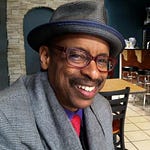vol. 2 issue 54
Note: docu-mental’s coverage of The Blacksmith is a joint venture with DC Metro Theater Arts. You can read a slightly different version of this feature and review/preview of Opera Lafayette’s production of The Blacksmith, here. The video interview above and the commentary in this feature is exclusive to docu-mental.
Greetings,
Take any decent road trip through the American West and you’re bound to pass half-a-dozen old opera houses in varying states of disrepair, or repair — if there happens to be a local renaissance underway. That’s because contrary to what you might expect, opera houses were essential for offering respite to the dusty rustiness of life on the frontier, being as they were the venue for itinerant entertainers, politicians, preachers, lecturers, and other speakers with news from back East.
Put another way: outside of the saloon, especially if a settlement lacked a strong enough contingent of righteous folks to see to there being a church erected, the opera house was the Old West’s quintessential all-comers meeting place.
And so it is with Mancos, Colorado, where a downtown rebirth is underway, the centerpiece of it being the opera house built in 1910, when the frontier was still rough. It’s a movement co-led by ranchers and artists, many of them retirees from the rat race, or newcomers fleeing fire-ravaged coastal areas. The collaboration is worth noting since, even if so far, there haven’t been any shoot outs, there has been plenty of hollerin’ over what constitutes correct land use and water rights, pitting oldtimers against the newbies.
Still, the shared vision is that the opera house will become a thriving performing arts and community center, a small business incubator, and all-around place where differences can be put aside and friends and enemies alike can come together, learn from one another, and focus on the future, while not forgetting their past, whether or not is a shared past.
Standing ovation from the socially-distanced audience for a performance of Opera Lafayette’s The Blacksmith, at Reddert Ranch in Mancos, Colo. Photo: Paul Boyer.
Enter into this fray, the Washington-based Opera Lafayette, which earlier this year was set to premiere its Old Westernized version of The Blacksmith (Le Maréchal ferrant), an 18th-century French comic opera composed in the mid-1700s by François-André Danican Philidor with libretto by François-André Quétant. OL stage director and musical arranger Nick Olcott along with OL founding artistic director and violinist, Ryan Brown, set their adaptation of the work in an 1890s American frontier town.
The premiere was intended as the restored opera house’s gala fundraiser opening night back in May, but then ol’ covid came riding into town and busted up the whole shindig. Of course, the show must go on, and so it did, even if a little later than planned.
This past October, with audience members seated on hay bales placed 6 feet apart, the show premiered on the Reddert Ranch just outside Mancos, the working cattle farm that has been in Brown’s family for generations, and where he has spent nearly every summer of his life.
Turns out, Reddert Ranch is also home to an historic blacksmith shop that served as the perfect backdrop for two well-attended, late afternoon performances, both of which were held on behalf of the Mancos Cattlemen’s Association and the Mancos Creative District. Each performance ended just as the sun was setting over the La Plata Mountains, not far from Mesa Verde National Park.
Full cast (L-R) Sarah Shafer as Jeannie, Arnold Livingston Geis as Cody, Dominique Cote as Marcel the Blacksmith, Joshua Conyers as Eustis, Pascale Beaudin as Claudine, Frank Kelley as Slim MacBride. Reddert Ranch outside Mancos, Colorado October 2020. Photo Credit: Paul Boyer.
The Blacksmith is typical 18th-century comedic opera fare: father arranges marriage for his daughter, daughter wants to make her own choice in love, daughter wants man who also happens to be her aunt’s object of affection, a fight breaks out, daughter accidentally “kills” their mutual paramour, chaos and comedy ensue, the dead comes alive, everyone sings about how they will now all live and love happily ever after.
It’s silly, but it’s human. And of course, no one lives happily ever after, they just live their lives, and everybody knows it, too. That’s why comic opera works, and why, once this particular show was re-worked to reflect the local memes and meanings, folks went nuts for it.
But there’s more to it than a good time was had by all. It was performed on the land, and above all else in the West, it is the land that matters.
Opera Lafayette founder and artistic director, Ryan Brown with musician and horsewoman, Lynne Lewis. Photo: Whitney Fishburn.
That’s what makes this interview with Maestro Brown and his friend and fellow rancher and musician, Lynne Lewis (who also plays guitar in the adaptation), so special to me. It’s a talk about music but it’s really about the place that we romanticize as the heart and soul of what America “is”: the Old West. And it’s a place that is finite, and people know that, too. Ain’t no one making any more of it, no matter how many of us want a piece of it.
It’s that scramble for limited resources that turns one group against another in our nation, forcing us to ask who deserves those resources more.
And yet, there is another way, we just don’t want as a nation to admit it: a return to how most indigenous peoples see the land. That is, that we belong to it. It does not belong to us. It is what hosts us, feeds us, provides for us.
This interview, the sixth video in the series docu-mental: healing the american states of mind, takes us back to the first and second videos where we considered how to move forward as a soulful nation, we need to own our sins, which include how we have treated the indigenous of this land, and enslaved black Africans.
It also connects with our third video, where we discussed how the performing arts can help us to create the necessary rituals for us to come together as a nation, but also as micro-communities, where it is easier to find common ground and values that bind, even if they do so in overlapping circles, where we might share a love for our local land, but not share a love of the same political point of view.
In that spirit, in this conversation, through the lens of a Westernized version of a French comic opera, with thoughts from two musicians, yes, but also two ranchers, we get to the heart of what’s been bugging all those other ranchers and newcomers to Mancos: who is entitled to the land and all it has to offer.
It’s important for the integrity of Brown and Olcott’s actual artistic intentions, to state that a discussion about land use wasn’t the point of their adaptation. That was more along the lines of how to succeed at the challenge of whether the use of cowboy vernacular and American folk tunes to “break the fourth wall” that separates the audience from the stage was possible.
Yet, what they have achieved offers the opportunity for anyone who cares to take it, the chance to consider what’s really at stake.
Some in this nation love what land like that in southwestern Colorado, and so many other places, can do for them, and so don’t really love the land itself, but the idea that it can confer power that others then can’t have, hoo-howdy! That’s sexy.
But, if you have been as lucky as I have been to spend a fair amount of time out West, riding, singing, hiking, or just visiting with folks who live on land, it’s impossible not to notice that these people really love the land. They also respect it. They have to! It’s beautiful, but it’s also dangerous. And even if they wouldn’t say it outright, they understand what it means to belong to the land and not the other way around. Howdy boy! That’s sacred.
It might not be in our respective lifetimes that it happens, but I envision there will be a day where, in part because we are moving to an increasingly virtual world, it will become natural to live according to the belief system still inherent to the indigenous nations of this continent, the one that doesn’t have us dominating the land, but living in dominion with it, and we will create economic systems and policies accordingly.
One reason I believe this is because, without the land we die. Enough of us are starting to understand at a basic level that simple, obvious, critical fact. It might take a while before those who want power over instead of partnership with the land die out, lose their grip, or otherwise get out of our way, but I believe it will happen.
And we can live at peace with our national soul again.
Although Brown demurred in an interview to affirm or deny whether his opera had outright helped heal the divide in his mountain town, he did acknowledge the feedback from The Blacksmith attendees was overwhelmingly positive, and described other opera projects he is hatching to more directly address what he called “hot button issues” on the minds of his fellow Mancosians.
“Everyone was all smiles and happy about what they were there for,” says Lewis. “Yeah, there’s a unity there. Not that it’s permanent, but it’s the kind of thing we need.”
Which is why once again, my faith in the power of the performing arts is redoubled.
Anytime opera demonstrates its power to tell stories that show how rifts can be mended, even if it’s with humor and silliness, we have the opportunity to remember what is possible once we put aside our differences: peace and prosperity.
When you listen to this interview, keep an ear open for the cattle lowing in the background…they’re there!
Tickets and other information for Opera Lafayette’s online production of Philidor’s The Blacksmith (Le Marchant ferrant) are available here. A live, one-time event on this Sunday, November 15, 2020, 2:00 p.m. (EST), includes a pre-show discussion with Maestro Ryan Brown, a virtual screening of the show, and a post-performance conversation with the artists.
On-demand access to the show runs from Nov. 16 through Nov. 29, 2020.
Here are the timestamps for this interview:
00:00 Introduction
11:30 By internationalizing opera, we've removed it from its power to speak to local audiences
12: 38 Opera's role in reminding communities what they have in common in times of culture clash
13:00 How opera can help bridge the old time ranching and newcomer crowds in Mancos and elsewhere
15:00 What happens in the communal experience of attending an opera
19:00 How opera gives us a lighthearted way to vet our culture wars and fights over shared resources
20:51 Ryan tells a story of how a Native American Indian shows a middle way to seeing past the problems created by our current cultural views on land ownership
23:30 How our system gets in the way of our mutual values and love of the land and what can we do about it?
30:00 The enduring power of money in the arts and how that impacts the future
32:33 How has our romancing the West helped to ruin it?
39:00 How micro-communities and their forms of entertainment helps foster decency among neighbors and lengthens and deepens the experience.
43:00 What we have lost to the past we can re-discover and merge with current technology to strengthen our communities
If you enjoy docu-mental, please take a moment to consider others whom you think might also like to learn more about the different ways we americans are finding peace and mental stability in these less than stable times and forward to them this or others of your favorite issues of docu-mental.
In the past year, we’ve covered a range of topics to do directly with mental health, as well as our spiritual and soul needs as a nation. Please take a ramble through the archives for podcasts, videos, and essays such as:
Etsy for your mind: the world’s first marketplace for mental health tools
Brain science is showing us what ‘normal’ is. Can it also help us evolve?
The use of art as ritual to help clear our country’s spiritual pollution
Democracy doesn’t evolve us, but it requires evolution
Ending ‘spiritual bypassing’ to build a better nation
Thoughts on complexity, god, messiahs, and the ‘Magnificent Work’
9/11, Coal Country, and what it means to be great
There’s still more to come before the year is out, but looking ahead to 2021, you can expect improved production values and more in-depth interviews, including with avant-garde musicians and composers who are deliberately making a statement about the mental, spiritual, and soul status as americans, as well as from cutting edge researchers and others investigating ways for us to find peace and balance. I’ll be bringing news from the frontiers of science, history, and other fields to you, and also sharing the ways you can access it without intervention from third parties whose primary goal is profit.
And if you’d like to become a patron subscriber, or give a gift subscription, here’s where to find the details:
You’ll get more content — shorter, but also more personal, quirky, and often lighthearted — like this outtake from the interview above that includes Lynne Lewis, rendering her version of The Blacksmith, along with Maestro Brown sharing his thoughts about the challenges and rewards of repurposing opera using American vernacular.
I also like to talk a lot about birds, so if you’re a bird jock, you will enjoy my spring migration updates for Washington, and other thoughts about nature, which for me, is how to heal ourselves. Nature never judges itself. It just is…and that’s some powerful juju to experience first hand, especially since we’re so filled with meanness these days.
Thanks for your time and attention.
Peace,
Whitney













